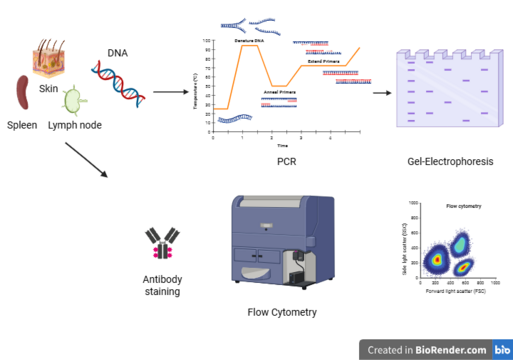14. Thema: Antigen-Presenting Cells – Characterization of the Initiators and Regulators of Immune Responses in the Gut
Supervisors:
Shashank Kumar, Philipp Münch
AG Clausen/AG Hövelmeyer,
Institut für Molekulare Medizin, Universitätsmedizin Mainz
Introduction to the Research Group:
Research in the Clausen lab focuses on the role and molecular regulation of dendritic cells (DC) in immune-mediated inflammatory diseases. Chronic inflammatory diseases arise from a loss of tolerance to self-antigens or harmless environmental antigens. DCs belong to the heterogeneous family of antigen-presenting cells and have the unique ability to balance immunity and tolerance. In peripheral tissues, DC detect pathogens as well as self and harmless foreign antigens, internalize them, and migrate to the nearest draining lymph node. In the lymph node, they initiate an appropriate effector or regulatory T- and B-cell response. Due to this property, DC represent attractive targets for developing novel vaccines to treat inflammatory diseases in humans.
The scientific focus of the Hövelmeyer lab is the context- and tissue-specific regulation of antigen-specific (adaptive) immune responses, particularly the role of B lymphocytes (B cells), which, in addition to their diverse functions, also act as antigen-presenting cells. Beyond the functional and molecular characterization of B cells and their subpopulations, the lab is particularly interested in the potential communication between different immune cell types and their roles in colorectal carcinoma, leukemia, and lymphomas.
Project Context and Description:
The immune system is divided into two main components: the innate immune system, which provides early protection against invaders, and the adaptive immune system, which executes targeted immune responses and builds long-term protection through the formation of memory cells. Since the gut-associated immune system is responsible for a significant portion of the body's defense, maintaining a well-functioning gut homeostasis is essential. In a healthy intestine, immune cells prevent commensal bacteria and pathogens that enter the digestive tract through food from invading the body. Approximately three-quarters of all antibody-producing cells (B cells) are located in the intestinal mucosa. Immunoglobulin A (IgA) proteins play a crucial role in forming a protective barrier at mucosal surfaces against pathogens and bacteria, including the gut. Microorganisms that still manage to penetrate the intestinal tissue are destroyed by macrophages and taken up by DCs, which then induce the formation of T- and B-effector cells in the mesenteric lymph nodes.
Project Goal:
The goal of this SommerUni project is to identify different B- and T-cell subtypes, as well as macrophages and DCs, using flow cytometry. For this purpose, single-cell suspensions from the spleen and lymph nodes will be isolated and stained with antibodies. Additionally, Langerhans cells from the skin will be analyzed using fluorescence microscopy. In parallel, mouse DNA will be purified, amplified via polymerase chain reaction (PCR), and subsequently separated by fragment size using gel electrophoresis.
As some of the supervisors speak English, very good English skills are required.
